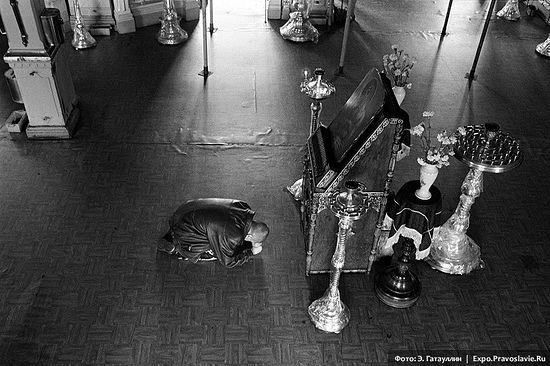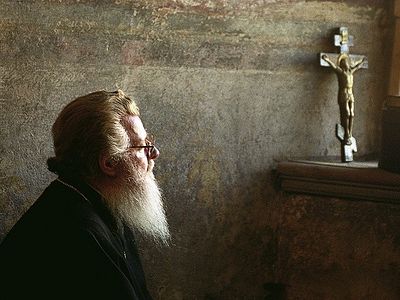It has been noted that forgiveness is often directly tied to repentance. This is doubtless true, but also fraught with misunderstanding. It is important to understand what forgiveness is and is not and what repentance is and is not. The heart is filled with twists and turns – understanding is helpful at every moment.
“Without repentance, there can be no forgiveness.” This, or something similar, is a common sentiment. Before we forgive someone, we want to know that they are actually sorry for what they have done and that they do not intend to repeat it. And this seems to us to be perfectly correct. And just as often we extend this spiritual justice to God as well and insist that repentance is a necessary component for forgiveness. “God will forgive anyone, if they truly repent,” we say.
But is this actually true? It’s worth reflecting on what is taking place.
First, it is important to remove forgiveness and repentance from a legal framework. A legal framework describes the world in terms of adherence to abstract rules and laws, simple declarations of how things “must be done.” This description almost always fails to ask whythings are as they are, or how they work. It dwells on the surface. A legal framework often bases itself on an understanding of justice, in which a balance is demanded. “If this is to happen, then this must be done.” It has the attraction of seeming fair. But it is inevitably the case that the exchange demanded is not balanced, sometimes because it cannot be. Forgiveness and repentance make much better sense if they are removed from the world of legal/forensic thought.
For a starting point, let’s consider this verse:
The Lord…is longsuffering toward us, not willing that any should perish but that all should come to repentance. (2Pe 3:9)
Here we can see that repentance is a goal – something we move towards. In Orthodoxy, repentance is not seen merely as a response to something we have done wrong, but our proper and natural state of being (the state for which we were created). Repentance is the state of the heart when it is entirely open to God. It is not just a change of mind (metanoia) on a particular matter, but a change of mind to its proper state of being. And thus St. Peter speaks of us “coming to repentance” (a state of being) and not merely “repenting” (a single act).
Sorrow over a past deed or action can indeed be part of repentance. It is normative. And true sorrow can move an injured person to extend forgiveness to us. It declares that we understand the wrongness of our actions and intimates that we have changed. As such, an injured party feels safer and in compassion and mercy may very well extend forgiveness to us. But such forgiveness, though generous, still comes at a price. A penitent must prove themselves deserving of such largesse.
Such an understanding is very much part of a legal framework. Prison systems are organized around this principle. Only there, punishment serves as a goad to sorrow. Prisoners facing parole must demonstrate that they have learned their lesson. The same reasoning makes many people loathe to improve the conditions of prisons, or to simply feel that the suffering of those in prison is deserved. On a personal level we also find ourselves feeling justified in withholding forgiveness, using our anger and resentment, and the weight of a broken relationship as tools of punishment.
There are two commandments of the Lord to consider:
If your brother sins against you, rebuke him; and if he repents, forgive him. And if he sins against you seven times in a day, and seven times in a day returns to you, saying, ‘I repent,’ you shall forgive him. (Luk 17:3-4)
And:
Judge not, and you shall not be judged. Condemn not, and you shall not be condemned. Forgive, and you will be forgiven. Give, and it will be given to you: good measure, pressed down, shaken together, and running over will be put into your bosom. For with the same measure that you use, it will be measured back to you. (Luk 6:37-38)
The first commandment refers to what we owe our brother. If he repents, forgive him. And we are reminded that we must do for him what we want God to do for us. The second goes further. Here we are under the heading of pure generosity. Here God will pay what is owed: give and it will be given and more besides.
But all things are for our salvation – it is the single good end towards which the good God works in all things. And this good end is also identified as repentance. To forgive a brother who repents, works towards our own repentance. To forgive even when no sorrow has been offered in return works an even greater repentance. For we are told:
…love your enemies, do good, and lend, hoping for nothing in return; and your reward will be great, and you will be sons of the Most High. For He is kind to the unthankful and evil. (Luk 6:35)
This latter gratuitous act of forgiveness offers more than a kindness to a repentant brother. It makes us like God, “sons of the Most High.”
Lessons of repentance abound in the life of St. Silouan of Mt. Athos. The Elder Sophrony relates a story about St. Silouan in his days before becoming a monk. The young man (then named “Simeon”:
…noticed a middle-aged fellow villager who was playing the accordion and dancing. This surprised him and drawing him aside he asked him, “How can you play and dance like that, Stepan – didn’t you once kill someone?” He had indeed killed a man in a drunken brawl. Stepan answered Simeon and said to him, “When I was serving my sentence I prayed and prayed, begging God to forgive me. And He did. That is why I can now play and be happy.” Simeon, who was himself burdened by the guilt of his own sins, understood how it is that one can ask God for forgiveness and obtain it, as in the example of Stepan. This event confirmed him further in his own personal repentance.
This story represents another aspect of true repentance. Here we see repentance as something that precedes forgiveness, but forgiveness clearly transcends any forensic concept. This forgiveness allows a man who has committed murder to sing and dance. There is no mention of reparations, of apologies to a family (though I cannot imagine that such would not have been forthcoming from this transformed, joyful soul.) But rather there is prayer, a yielding of a pliant soul to the grace of God.
Repentance as a state of the heart always cries out to God for grace. It longs for the grace of God to complete it and fulfill it, to make whole that which is lacking. We were created to live in such a state. Such a state is also aware of that which is lacking, not because it focuses on itself, but because it aches in the absence of grace. Psalm 51/50 has traditionally been seen as the most perfect expression of this heart – thus earning its place as the most often repeated Psalm in the Orthodox liturgical life.
It is a mistake to become formulaic about forgiveness and repentance, creating rules about what must come first or the conditions required. The heart and the complexity of life do not conform to such things, nor is God bound by such concepts. He is the Good Shepherd, the Physician, who knows His sheep and calls us each by name. He knows “the name and need of each.” All of these things are driven by the goal of the heart in a state of repentance. How we reach such a goal cannot be predicted or dictated by formulaic doctrinal descriptions. It happens according to the mystery of God’s grace.
For the believer whose heart is in the state of repentance, Luke’s description of gratuitous forgiveness is normative. He is a “son of the Most High” and gives even to the evil and the ungrateful. The abundance of grace that flows from his heart cannot be held back by a lack of sorrow or remorse. In the joy of the Resurrection he “calls ‘brother’ even those that hate him and forgives all.”
The believer who lives waiting to be asked to forgive is dangerously close to the Lawyer who asks, “Who is my neighbor?” He is too likely only to forgive with the measure of someone’s sorrow and learns to hold back what could be given freely. There is a caution in his heart that becomes the enemy of grace and repentance.
The kingdom of heaven suffers violence, and the violent take it by force. (Mat 11:12)




